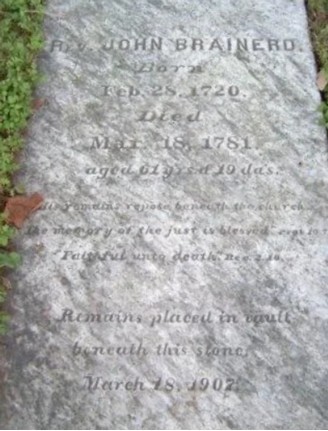John Brainerd
“His humility, his self-denial, his perseverance and his flaming zeal for God, are exemplary in deed.”
(Thomas Coke)
The Life and Legacy of John Brainerd
John Brainerd, often remembered as the steadfast younger brother of the famed missionary David Brainerd, carved out his own quiet but durable place in the story of early American missions. While history sometimes overlooks those who labor in the shadow of a better-known figure, John’s life stands as a reminder that perseverance, duty, and faithfulness—carried out day after day—build much of the good that endures. His work among Native American communities in the mid-18th century helped establish stable mission efforts, preserve the progress begun by others, and shape the early missionary spirit that later spread widely through American churches.
Born in Haddam, Connecticut, in 1720, John Brainerd grew up in a devout home shaped by Puritan discipline and earnest Christian instruction. The Brainerd household valued learning, moral seriousness, and a dutiful approach to life—qualities John carried with him throughout his years. As a young man, he attended Yale, intending to enter the ministry. During these same years, his brother David was struggling through hardship, illness, and frequent discouragement during his missionary labors among the Delaware Indians. When David’s health broke, he entrusted the fragile mission to John, believing his brother possessed the steadiness and commitment needed to preserve the work.
In 1747, shortly before David’s death, John Brainerd took up the missionary task at Crossweeksung, New Jersey, and later at Cranberry and Brotherton. At a time when the colonies were unsettled by conflict and Native communities faced constant pressure from disease, displacement, and shifting alliances, John assumed responsibility for a mission that could easily have collapsed. Instead, he brought order, structure, and practical wisdom to it. He organized schools, cultivated land for food, and secured clothing and supplies for the people under his care. His approach was both pastoral and practical—he believed that spiritual instruction had to be accompanied by stability, dignity, and the ordinary necessities of daily life.
Though John lacked his brother’s fiery temperament, he possessed something equally valuable: endurance. For nearly three decades he served as missionary, teacher, farmer, interpreter, and advocate. He learned the customs of the Native communities, built trust through steady conduct, and worked to preserve what had been gained during the earlier revivals. Even when support from missionary societies was irregular and living conditions were challenging, he remained committed. This everyday faithfulness—quiet, consistent, and without complaint—gave the mission a longevity it would not otherwise have had.
John Brainerd also understood the importance of education in shaping both character and future opportunity. Under his leadership, mission schools taught reading, writing, Scripture, and basic trades. He saw learning as a tool that enabled dignity and independence. He also encouraged opportunities for Native students beyond the mission, sending several to institutions like the College of New Jersey (which later became Princeton University). His concern for the next generation showed a long view—a recognition that true reform and true growth take patience and steady cultivation.
As years passed, the pressures on Native communities increased. War, disease, and the continual push of colonial settlement forced many to leave familiar lands. John Brainerd often stepped into the role of advocate, petitioning government officials on behalf of the people he served. His letters are filled with a mixture of courtesy and firm appeal, reflecting both his respect for authority and his sense of duty toward his flock. He fought for land rights, financial assistance, and fair treatment, not with anger or agitation but with reasoned argument and persistent effort. In this way, he demonstrated a kind of leadership grounded in principle rather than personal ambition.
Eventually, declining health and diminishing financial support made continued missionary labor nearly impossible. After leaving the field, Brainerd served as a pastor in several congregations in New Jersey, bringing to them the same reliability and quiet strength he had shown among the Native communities. He died in 1781, leaving behind no dramatic stories, no widely published works, and no personal fame. Yet his influence lived on in the lives he steadied, the communities he strengthened, and the missionary spirit he helped shape in early America.
The legacy of John Brainerd rests not in spectacle but in steadfastness. He belonged to a generation that prized duty above self-promotion and measured success not by public acclaim but by faithfulness to one’s calling. He took up a work begun by another and, rather than seeking to surpass or redefine it, devoted himself to preserving and deepening it. There is humility in that choice, and also a certain kind of quiet heroism.
Today, John Brainerd offers an example worth remembering. His life reminds us that good work often takes the shape of long obedience, steady hands, and a willingness to labor without applause. He demonstrated that true service is marked not only by conviction but also by practical care—feeding, teaching, building, and maintaining what others began. In an age that sometimes values novelty over tradition, Brainerd’s life points back to the strength found in older virtues: perseverance, responsibility, and a commitment to the welfare of those entrusted to one’s care.
In the end, John Brainerd’s story stands as a tribute to the power of quiet faithfulness. His legacy, though less celebrated than his brother’s, is woven into the early fabric of American mission history. By holding fast to his calling and honoring the work passed down to him, he left behind something steady and lasting—an inheritance built not on personal glory but on faithful service.
_____
Image Source/Credit (in order):
-
“John Brainerd (1720-1781) — Log College Press.” Log College Press, www.logcollegepress.com/john-brainerd-17201781.
Related
Sorry, no records were found. Please adjust your search criteria and try again.
Sorry, unable to load the Maps API.
